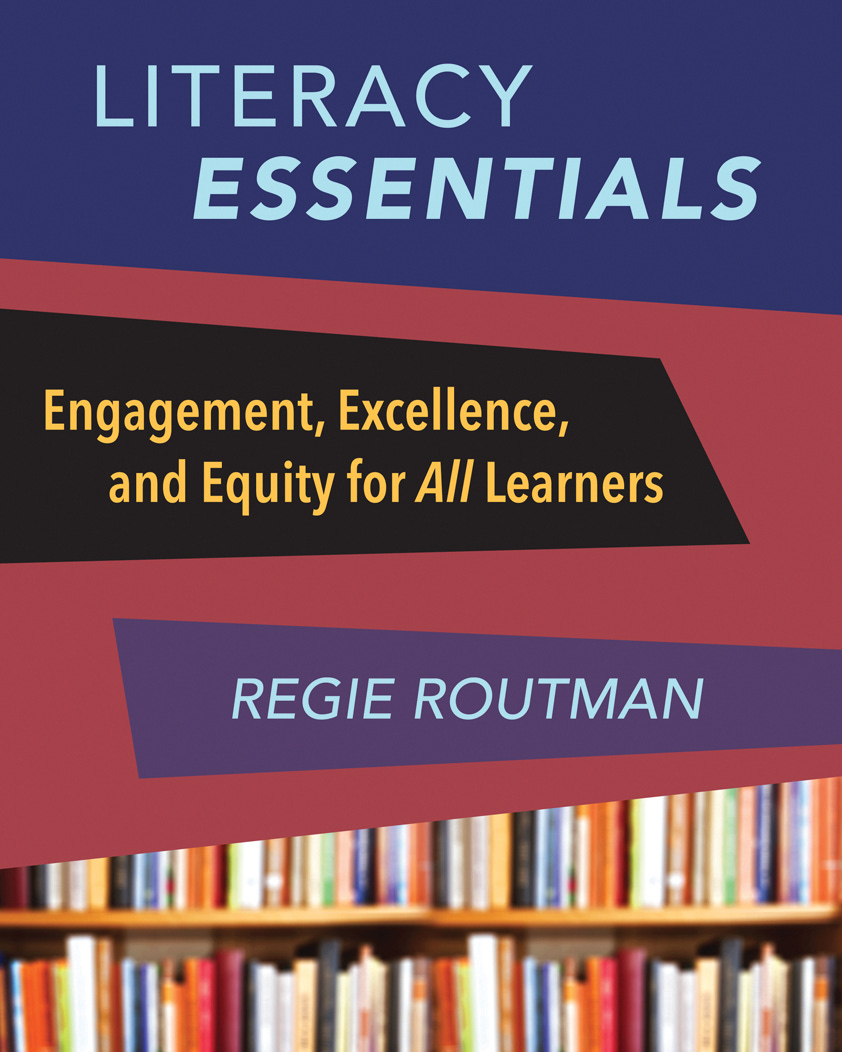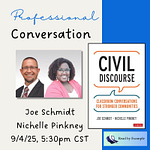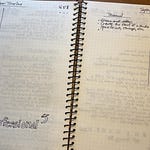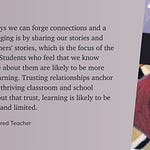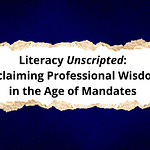In this special episode, recorded during our third and final writers group, we talked shop - writers workshop - with Tom Romano and Regie Routman.
Tom is the author of several books on writing, including Write What Matters: For Yourself, For Others.
Regie has also authored many professional literacy resources for educators, most recently Literacy Essentials: Engagement, Excellence, and Equity for All Learners.
So get out your notebooks, settle in with a favorite beverage, and soak up the wisdom from two excellent teachers of writers and writing.
Related Resources
Tom’s article we discussed: “Giant at Reds”
Regie’s article we discussed: “Roaming Around the Known” (plus her website)
A book Tom recommended about writing memoir: Inventing the Truth
Check this episode out on Apple below, and give the podcast a rating!
Full Transcript
Matt Renwick:
In this special episode recorded during our third and final writers group, we talk shop - writer's workshop - with Tom Romano and Regie Routman. Tom is the author of several books on writing, including Write What Matters For Yourself, For Others. Regie has also authored many professional literacy resources for educators, most recently, Literacy Essentials: Engagement, Excellence, and Equity For All Learners. So get out your notebooks, settle in with a favorite beverage and soak up the wisdom from two excellent teachers of writers and writing.
Matt Renwick:
Again, feel free to chime in, any questions or if you want to piggyback, for Tom or for Regie. And you both spoke to this just now, which is great. And in your pieces that I shared out too, involve story. Is that a great place to start with writing or do you see it as more than just a tool for your own writing purposes I guess? I'll start with Tom on that.
Tom Romano:
There is very little I write that doesn't have story in it some way. If I'm writing that piece about the night the giant visited, I mean, it's pretty much all story, except, I think the last part in the last paragraph and that version of, did I say about giants all around us and teachers, I guess there I'm being a little bit expository. But I can't imagine writing anything that doesn't have at least the kernel of story in it, because stories appeal to us all. They are how we know the world. I mean, think about the trial that just ended. There were two stories, two arguments, but here's the story of how this went down, here's another story of how this went down.
Tom Romano:
For me, it's just, the story is bedrock. I guess that's why I always, when the Common Core standards came out in Ohio, well, I guess they were nationwide, and then they got rid of them, and then pretty much states just use them anyway and call them their own standards. They seem to me to really disrespect story and how I know story work in people's writing. So what did I just read? I just read an Anne Lamott book that was published in 2017 or 2018. And she said, "Story abideth." Tom just ran out of gas here, go ahead Regie.
Regie Routman:
No, I agree with everything you said. A story for me, I'm looking at it in a little bit different way. I'm trying to be an anti-racist like everybody else, not just talking about it, but trying to do something. And one of the ways I think that's very powerful is valuing every child's story and having them write their story and honor that story, their language, their culture that goes with it through poetry, through a vignette from part of their life, writing about something that happened that, the story of their life. And using story in a way that even though that story that you've just written was very painful perhaps, you're working with older kids, your story is not foretold by what's happened so far. But your story can be changed. And using story in that way is a part of what I'm working on now, that you have the power to rewrite your story. That might seem preordained because of your circumstances, because of your housing, lack of resources, but it's not.
Regie Routman:
So I see our job as educators, as being opportunity makers. And one way to do that is to get kids to write and first to value their own stories, which is so, so powerful. And then I would model, of course I would share one of my stories that shaped me. And it would be probably about my grandmother who never went to school, but never got past fifth grade because she had to support her family and didn't consider herself a writer. But when I would stay overnight with her, she'd pull out this big brown box from the top of her closet, and she was writing her stories down, but didn't consider herself a writer.
Tom Romano:
Wow.
Regie Routman:
But she was.
Matt Renwick:
You both speak to a sense of self-empowerment too, with Tom writing in the study halls and your grandmother writing, but not identifying as a writer themselves. And I noted in Tom's book here on page four, just your first activity here, Tom says, "Give yourself 15 minutes long if you need it, write about why you write, what you get out of it, and what rewards writing holds for you. Maybe you've not articulated that before, don't be afraid to ramble, Joey wasn't. With faith and fearlessness write through to the truth." I've heard that phrase before, "Write through to the truth." Tom, can you say more about that?
Tom Romano:
Write through to the truth. From last June until January, I wrote a memoir that I'm trying to find a publisher to read, and that's not always easy since it's not really a Heinemann book, or a Stenhouse book, or Scholastic book. But a lot of times I'm just trying to tell things as truthfully as I can, the way I remember, the way that I imagine it. Like that giant story, I was thinking about that. I mean, I think there's truth in there. There's a lot that's made up. And what I mean is, I don't remember that... Like I say, Joe Keester, there's a character who said, "That's Paul Bunyan" right off the bat. Well, I don't remember that happening, but my dad had a friend named Joe Keester and I found out some way that that wrestler was Paul Bunyan. And so I invented that.
Tom Romano:
There's a book called Inventing the Truth and it's about writing memoir. So there's a lot of places in there where I think I did invent the truth. Although I stayed close to the emotions, I'm pretty sure I remember feeling. And some of the things that were indelible memories, like when he would, I think I wrote that, "He would put forward and all his hair would go over his face and then he would go like that and comment like that, and then push it forward." That's an indelible memory. I really believe in those for sure. Now I want to get kids, whether they're elementary school kids or graduate students in a class, I want them to start trying to find those indelible moments or indelible memories. They don't usually last very long. And I want them to write about those.
Tom Romano:
I think the last two or three things that I have published in English Journal came from me, writing in my college class with my undergraduates. I asked them to find indelible moments. And I did that too with them and develop that into a piece of writing, which I'm trying to stay close to how I remember and how I think. Yeah. Writing through to the truth.
Regie Routman:
I think one of the, I used to tell the kids the secrets of what writers do, is that when they write memoir, I remember working with fifth graders on this, that you can't possibly remember what was said, what somebody said five, six years ago.
Tom Romano:
No.
Regie Routman:
So you have to invent that dialogue, but the feelings are true. And as long as you stay true to those feelings, right, it's going to work because you can't remember exactly what happened. But you do, those feelings are there.
Tom Romano:
You mentioned dialogue, Regie. I always thought in schools, that's the great underused form of expression, that kids don't put dialogue in their pieces. And I love dialogue. When I'm reading a novel, I love turning the page and see those indentations. I want to invent that dialogue that moves my story along. I think that makes for good reading.
Matt Renwick:
Really reveal characters and what they're thinking, and then move things along and apply. And as you said, evoke that feeling. And you've both used journals, notebooks, I should say, how do you use them specifically? Everyone has a different method to help, not just document experiences, feelings, and moments, but also to generate more writing and document your reading. Regie, how do you use notebooks specifically and why do you...?
Regie Routman:
I specifically grab my notebook and let me just find it. Start with Tom or someone...
Matt Renwick:
All right.
Tom Romano:
I have friends, Penny Kittle and Linda Reef. Their notebooks are just beautiful. I mean, they write in them, but they also draw in them and they're aesthetically pleasing on their own, I think what they're creating. And I also know that Penny, a lot of times will, if she's writing the piece for Voices From the Middle or any other publication, that she will often draft in the notebook. I don't do that. I can't do that. If I have a piece I know I'm going to write, I might doodle a little bit in the notebook, but I would get out of a yellow pad. And part of the reason I use a yellow pad instead of drafting on the computer is because I like to drink coffee and I don't want it to get cold too quickly. So I could write with my left hand and drink coffee with my other hand.
Tom Romano:
The way I use the journal is pretty much to collect things. People say things I noticed rambling around in my thoughts. As I told you, that I would start to write on a note pad if I had something that I wanted to write for publication. I just thought of an exception to that. When I came home from Italy in 2018, my wife and I spent two weeks in Italy and we came back, I had some things to write about and I wrote about them discursively in my notebook, went on for several pages. When I was writing in this memoir and I came to the chapter that had to do with that subject matter, I went to my notebook and typed a lot of that stuff that I used for the chapter then. I guess once in a while, I might start an article or a chapter in there. Regie, what about you? How do you use that notebook?
Regie Routman:
Well, it depends what's going on in my life, right, at the time. So like the article that you have for me, Roaming Around the Known with an Adult Learner, I'm working right now twice a week, tutoring, a 54 year old man teaching him to read. And so that's been pretty fascinating. And so you've got the start of the story there. Now we've been working together for 10 months. And I've always worked like this. So I have a notebook and it's just messy. But every time that I'm working with them, I'm writing down everything that he's saying, everything that we're doing, thoughts that come into my head. This is like almost a full notebook just from working together.
Regie Routman:
And at some point, you can see just a lot of writing there. What happened, what I'm thinking. I use it a lot for reflection and I know I'm going to write something from that. I have no idea what it's going to be. But it's the only way I can remember. I used to tell teachers, "Even though you've got all those kids in front of you, tell them, show them your notebook." Okay. Kids take out your book. I write down what just happened because I don't want to lose it. You just can't remember even the actual words that somebody said. And a lot of the kids will start keeping their own notebook. I think of it more as a place to reflect. Then I go back and look at it.
Regie Routman:
But this is such an intense thing that I'm involved in right now. So I have a whole notebook just devoted to that. And that's been really helpful because there's no way I could remember some of the gems that he says, it helps me with my planning and also the writing. And then I feel like I have a body of work there.
Tom Romano:
I mean, who knows if I'll write another book. But when I'd have a professional book, I wanted to write, I would go back to my notebooks from where the last book ended. And I would read through everything for maybe three, four years just to see what I could pick up. And invariably, I picked up stuff that I had completely forgotten about, that I was able to then use in the book.
Matt Renwick:
This is great. I can listen to this all day. And normally when I have more time, I send the questions ahead of time for doing a podcast or something like that. But we can tell Tom and Regie had no problems speaking very knowledgeably about this topic. But does anyone else have any questions for Tom or Regie?
Virginia Soukup:
Not a question. I just wanted to comment about Regie's notebook, since you encouraged me last time to start one. I have. And so I keep one at school about the different things that teachers are doing just to... Because that's what I like to write about. It's the work. So you inspired me to start that.
Tom Romano:
Regie, what gave you the idea to start writing in a notebook regularly? When did you start that?
Regie Routman:
I have no idea. I don't ever remember being told that I was a writer. I always wrote poetry for some reason, but it was the rhyming poetry. Of course, it's all free verse poetry. I don't know. I think it was... When I started this first grade book flood, what was called this experiment in this school in Shaker Heights, where the kids were all failing in literacy, I just did it. I got introduced to Don Graves' work. Maybe it was something I read from him. I don't know. But it just seemed to make sense. I wasn't smart enough to remember everything. And so I had to write it down. What are the kids saying? What are they doing? What's the plan for the next day?
Regie Routman:
It wasn't a notebook in the sense of the way Penny keeps it. It wasn't like I'm thinking about writing ideas. It was, here's what I'm thinking about my life, about one of the things that I did because I want those of you that are teachers like me to also be bringing your life into the classroom. So in my last book, Literacy Essentials, I interwove stories, professional and personal stories into my book and then recorded them to speak them, which I think is really important because for... And you can find that on my website, if you wanted to see that. I think for kids whose stories are not valued, their culture is not valued, and even if they're having struggle with reading and writing, they can record their stories. That's so powerful. Oh my goodness, look, I'm a writer. And then they see it in writing and it makes them feel like they're a writer.
Regie Routman:
So it's been always important to me to bring my life, not separate my life like this and cooking from my husband and not having hugged my grandkids yet and what that's like to bring that into school as part of the stories that I tell. And that helps kids value. "Oh, she's just writing about hugging somebody. Well, I could write about that." Or just not to separate it as their school writing and then there's home writing. I think of it as teaching, learning and living and they all go together.
Tom Romano:
That is a good title, Regie.
Regie Routman:
I know. I'm thinking about my next book because I think we separate it too much. We separate it too much. And Matt knows. We've talked about this a lot because we've become good friends over the years, is always all about relationships. Kids are not going to bare their soul if they haven't developed a trusting relationship with us, right?
Tom Romano:
Right.
Regie Routman:
And so that's true with school and it's true with real life, right? Everything is about trusting relationships. So I think they all go together. And so I don't know, I just write whatever comes into my head. So then I don't want to forget it. And then I can go back to it. I have like this. I probably have about eight notebooks over... One notebook might last me, I don't know, six months, it might last me three months, it might last me two years. And I keep everything in one notebook so that I can find it. And then I just read. So if I go to a conference, my notes are there. So I can always find what I'm looking for by the date. So I think it's a little different than just whatever works for you. But they can also keep just a simple notebook and reflect on their life and ideas and what they're thinking. And it doesn't have to be complicated.
Matt Renwick:
Just get it down.
Tom Romano:
Can I say one other thing about that?
Matt Renwick:
Please.
Tom Romano:
I think that writing in a journal notebook taught me how to write better. I wish that a teacher had told me, that had me in high school, "Keep a notebook. Start keeping a journal." Because I didn't start writing in a journal until I was about, I would be about 24 years old in the summertime I was taking classes. I read Daniel Fader's Hooked On Books. And one of the things that, he had them reading paperbacks, huge new thing then, right. Having these juvenile delinquent kids read paperbacks, and then also keep a journal. And I thought, this is just the thing for... I had some kids in a class ignominiously titled Basic Skills for juniors in high school would not turn you on. But I thought, this is perfect for those kids to help them write a journal. And then I thought, well, I better do this myself if I'm going to have them do it. And man, I've been hooked on that ever since.
Matt Renwick:
Yeah. Both of you as the adults in the room or the teachers in the room, you go first and then the kids follow.



